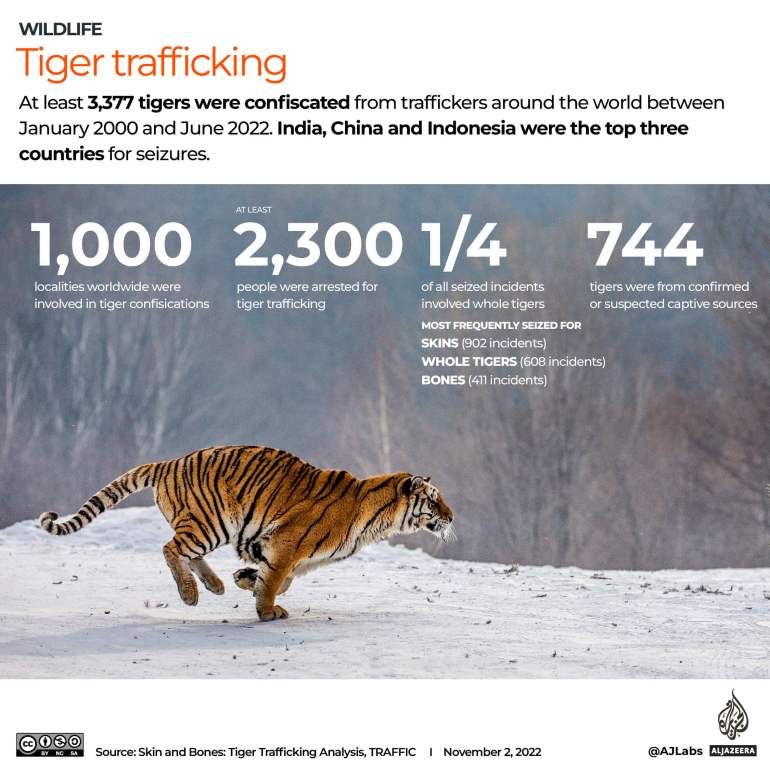Illegal trade threatens endangered tigers, 150 seized a year
Poachers continue to target the big cat for its skin and body parts, undermining conservation efforts.

Global seizures of tigers and tiger parts have averaged 150 of the big cats a year over the past 23 years, according to a new report, underlining the pressures facing an animal that is severely endangered in the wild despite continuing conservation efforts.
Overall, entire tigers, dead and alive, as well as a variety of tiger parts equal to a conservative estimate of 3,377 big cats were confiscated between January 2000 and June 2022, wildlife trade monitoring group TRAFFIC said in a report released on Wednesday.
Keep reading
list of 4 itemsIs there still a chance to save the Malayan tiger?
‘Tiger on my farm’: India coal hub brings new dangers in villages
Bangladesh arrests suspect believed to have killed 70 tigers
The seizures took place in 50 countries and territories, but the vast majority were in the 13 countries where tigers can still be found in the wild.
India, which is home to half of the world’s remaining wild tigers, reported the most incidents, as well as the highest number of confiscated tigers. China (212 – 10 percent of the total) and Indonesia (207 – 9 percent of the total), were next.
TRAFFIC cautioned that given the nature of the illegal trade, while the numbers indicated the level of trafficking, they were unlikely to reflect the true scale of the criminality.
“The evidence clearly shows poaching and illegal trade are not temporary threats. Unless we want to watch wild tigers wiped out in our lifetime, immediate and time-bound actions must be a priority,” said Kanitha Krishnasamy, co-author of the report and director for TRAFFIC in Southeast Asia.

Seizures in the first half of 2022, the Year of the Tiger in the lunar calendar, indicated poachers were involved in the “relentless pursuit” of the world’s remaining wild tigers, TRAFFIC said.
There were “significant” increases in animals seized in Indonesia, Thailand and Russia, it noted.
Indonesia, home to the critically endangered Sumatran tiger, seized more equivalent tigers in the first half of 2022 (18) compared with its entire 2021 confiscations (16).
“Poaching and illegal trade remain perilous threats to the survival of wild tigers,” the report said. “Decades of effort, investments and pledges have not eased pressure on wild tiger populations.”
The wild tiger population was thought to number at least 100,000 in 1900, but hunting, poaching and the destruction of the tigers’ forests have left the animals confined to only a few countries in South and Southeast Asia, as well as Russia’s far east.
Experts say tiger poachers feed into an illegal trade fuelled by demand, mostly in China and other parts of Asia, from people who believe consuming certain tiger parts will cure myriad diseases or improve their strength and virility.

TRAFFIC’s latest report said it had identified at least 675 Facebook profiles in six Southeast Asian nations that were involved in the illegal trade and that three-quarters were from Vietnam. It also noted links between accounts involved in the illegal sale of tigers and tiger parts with those offering products made from ivory, bear parts and rhino horn.
The report also noted that in the last couple of years more tigers had been confiscated that were either confirmed or suspected of coming from captive sources, such as zoos or breeding farms. More than half the seizures in Thailand and Vietnam involved suspected captive-bred tigers, it said, an indication of the “significant problem” created in the battle against tiger trafficking.
Given the persistence of the illegal trade, the conservation group urged countries to make law enforcement more effective by using intelligence-driven investigations to dismantle criminal networks along the entire chain, and ensure “strong and predictable” prosecution to deter traffickers who stand to make considerable sums from the trade.
“Ever-increasing penalties may not be as effective as hoped, instead increasing the likelihood of traffickers getting caught and convicted in the first place can more effectively influence the cost-benefit evaluation of prospective criminals,” the report said.
Other recommendations include the closure of markets – including those online – dealing with the illegal trade of tigers and their parts, stricter control of tiger farms and more targeted actions to reduce demand.